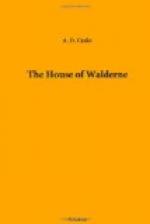“I know not, my lord.”
“Ah, the Saints be praised, there is a light close at hand. It shines clear and distinct—now it is shut out.”
“A door or window must have been opened and closed again.”
“So I deem, but this is the direction,” said the knight as he turned his horse’s head northwards.
Let us precede knight and squire and see what awaited them.
Upon a spot of firm ground, free from swamp, and clear for about the area of a couple of acres, stood a few primitive buildings: there was a barn, a cow shed, a few huts in which men slept but did not live, and a central building wherein the whole community, when at home, assembled to eat the king’s venison, and wash it down with ale, mead, and even wine—the latter probably the proceeds of a successful forage.
Darkness is falling without and the snowflakes fall thicker and thicker—it yet wants three hours to curfew—but the woods are quite buried in the sombre gloom of a starless night. The central building is evidently well lighted, for we see the firelight through many chinks in the ill-built walls ere we enter, although they have daubed the interstices of the logs whereof it is composed with clay and mud almost as adhesive as mortar. Let us go in—the door opens.
A huge fire burns in the centre of the building, and the smoke ascends in clouds through an opening in the roof, directly above, down which the snowflakes descend and hiss as they meet their death in the ruddy flames. Three poles are suspended over the fire, and from the point where they unite descends an iron chain, suspending a large caldron or pot.
Oh, what a savoury smell! the woods have been ransacked, that their tenants, who possess succulent and juicy flesh, may contribute to appease the hunger of the outlaws—bird and beast are there, and soon will be beautifully cooked. Nor are edible herbs wanting, such at least as can be gathered in the woods or grown in the small plot of cultivated ground around the buildings; which the men leave entirely, as do all semi-savage races, to the care of the women.
There is plenty of room to sit round this fire, and several men, besides women and boys, are basking in its warmth—some sit on three-legged stools, some cross-legged on the floor—and amidst them, with a charming absence of restraint, are many huge-jawed dogs, who slobber as they smell the fumes from the pot, or utter an impatient whine from time to time.
Their chieftain, a man of no small importance judging from his dress and manner, sits on the seat of honour, a species of chair, the only one in the building, and is perhaps the most notable man of the party. He is tall of stature, his limbs those of a giant, his fist ponderous as a sledge hammer; a tunic of skins confined around the waist by a belt of untanned leather, in which is stuck a hunting knife, adorns his upper story: short breeches of skin, and leggings, with the undressed fur of a fox outside, complete his bedecking.




